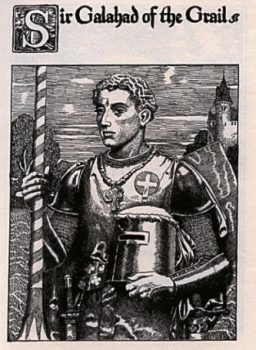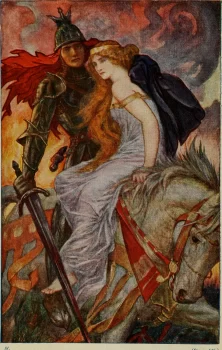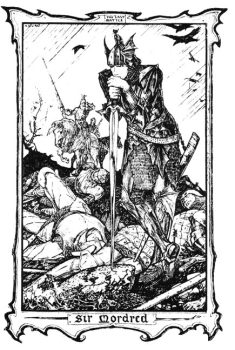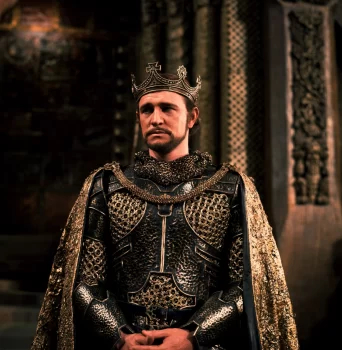THE ONCE AND FUTURE KING, PT2 by T.H. WHITE
“Thomas, my idea of those knights was a sort of candle, like these ones here. I have carried it for many years with a hand to shield it from the wind. It has flickered often. I am giving you the candle now — you won’t let it out?”
“It will burn.”
King Arthur to Tom of Warwick, p. 647 The Once and Future King
Read the first part of this review, Might For Right: The Once And Future King, Part 1 By T.H. White.
The first two volumes, The Sword in the Stone (1938) and The Queen of Air and Darkness (1939), of T.H. White’s The Once and Future King focus on the rise of Arthur Pendragon and the foundation of his kingdom, where right, not might, is the rule. The following two volumes, The Ill-Made Knight (1940) and The Candle in the Wind (1958), tell the story of Lancelot and Guenever’s affair and subsequent rot and collapse of the Round Table and Arthur’s kingdom. At the end of The Queen of Air and Darkness, White reminds the reader that in the tales of King Arthur, sin comes home to roost and that sometimes, even innocence isn’t enough to prevent ruination. In these two books, however, no one is innocent.
Lancelot made his first appearance in The Queen of Air and Darkness when his father lent his aid to Arthur for the Battle of Bedegraine. It was then as a young boy that he had decided he would dedicate himself to Arthur’s vision of a better world.
Ill-Made Knight is the name Lancelot takes for himself. He is no Franco Nero or even a Robert Taylor (both played Lancelot in the movies), but instead a misshapen, ugly man.
He had already decided that when he was a grown knight he would give himself a melancholy title. He was the eldest son, so he was bound to be knighted, but he would not call himself Sir Lancelot. He would call himself the Chevalier Mal Fet — the Ill-Made Knight.
So far as he could see — and he felt that there must be some reason for it somewhere — the boy’s face was as ugly as a monster’s in King’s menagerie. He looked like an African ape.
Lancelot is driven by three loves in his life; for Arthur, for God, and for Guenever. As much as he struggles to stay loyal to the first two, his desire for the third always overwhelms the others. This triangular affair he finds himself in is not the ultimate cause of — that is Arthur’s father’s rape of Igraine — but it is the match that allows everything to be set alight.
The first is clearly almost as much romantic as it is Romantic. He dedicates his childhood utterly and completely to perfecting his body, his combat skills, and his understanding of Chivalry. When he learns of Arthur’s marriage to Guenever, he immediately strikes out for Britain with the intention of becoming a member of the Round Table.
Lancelot is driven by his jealousy of Gunever, over which he feels shame, as much as his knightly goal. Almost as soon as he sets foot in Britain, he finds himself in a joust with an unknown knight in black armor. He unhorses the black knight at once, who then reveals himself to be Arthur. Delighted to meet the boy now become a young man, Arthur knights him at once and appoints him to the Round Table.
His love for God is less clear, though it reappears consistently over his life, driving him to great despair and as a source of trouble with Guenever. At one point he tells her that he dreamed of performing a miracle.
This knight’s trouble from his childhood — which he never completely grew out of — was that for him God was a real person. He was not an abstraction who punished you if you were wicked or rewarded you if you were good, but a real person like Guenever or Arthur, but the point was that he was personal. Lancelot had a definite idea of what he looked like, and how he felt — and he was somehow in love with this Person.
The Ill-Made Knight was not involved in an Eternal Triangle. It was an Eternal Quadrangle
Later, believing himself no longer capable of such a feat, he tells her that he has given up the ability to her as a gift of to her love. It is never far from her thoughts that he has given up much for her, but, of course, as they can never live openly, it is never enough and it gnaws away at her over the years.
It is when Arthur asks the Queen to be kind to the young knight after he first arrives that Lancelot’s love for her is kindled. As she helps him with his falconing the pair fall in love. Remembering a prophecy by Merlyn, that his best friend and his Queen would fall in love, Arthur tries to push the idea from his mind. How could his best friend betray him if he was his best friend, puzzles the King? In the end, he brings Lancelot along on his great war against Rome.
During this warfare Arthur became genuinely fond of Lancelot, and, by the time they came home, he no longer believed in Merlyn’s prophecy at all. He had put it at the back of his mind. Lancelot was acknowledged to be the greatest fighter in the army. Both of them were determined that Guenver could not come between them, and the first few years were safely past.

On their return to Britain, Lancelot tells Arthur he wants to set out on a Quest, to carry out some great deed for the honor of the Round Table. While Arthur is upset at this, Lancelot persists. His true goal is to remain apart from Guenever and stay true to his friend and king.
On one quest, Lancelot is tricked into thinking a woman he rescues, Elaine, is really Guenever and he sleeps with her. In anger and fear, he flies back to Camelot. Later, Elaine appears with a child she has called Galahad, Lancelot’s true first name. Guenever is furious and Lancelot is driven mad. Years later, Galahad is knighted and becomes the purest and greatest of all knights and the one to attain the Holy Grail. After years of madness and exile, Lancelot returns to Camelot and Guenever.
White depicts Lancelot as a man driven to goodness and holiness because of his awareness of his own awful tendencies.
His Word was valuable to him not only because he was good, but also because he was bad. It is the bad people who need to have principles to restrain them. For one thing, he liked to hurt people. It was for the strange reason that he was cruel, that the poor fellow killed a man who asked for mercy, or committed a cruel action which he could have prevented. One reason he fell in love with Guenever was because the first thing he had done was to hurt her. He might never have noticed her as a person, if he had not seen the pain in her eyes.
In his struggle to be good and decent, instead of just running off with Guenever, he strives to find a way to stay true to Arthur and the Table. This, which becomes common enough knowledge sets about undermining the Table, and the Queen becomes disliked by the public. Twice Lancelot is forced to defend her in trial by combat. The first is when she is accused of poisoning a knight and later when she is accused of unfaithfulness to Arthur. In both cases he prevails, though in the latter, he knows that he has killed a man who hadn’t been lying.
Much of the undermining is done by Mordred, the son of Arthur, and his sister, Morgause. While his older brothers, Gawaine, Agravaine, Gareth, and Gaheris escaped her manipulative and wounding clutches, he remained with her. He is a bitter and twisted young man, dismissive of his father’s dreams and, of course, the crime against his grandmother, Igraine. Later, it is revealed he has another great grievance against his father.
Still only nineteen, Arthur had been told that it had been prophesied that his child with Morgause would be evil. Panicking, he decreed all children born on a certain day be put to sea in a boat. Of those children, only Mordred survived. This is Arthur’s own great sin that ultimately comes bearing down on him and his hopes.
Arthur’s first plan for a better world was built on redirecting the violent tendencies of men to acts of goodness and justice. Sadly, he comes to learn that once this new world has been built and there is no more need for battles and quests, his men become bored and prone to reverting to their old ways. In consultation with Lancelot, he comes to believe he has left God out of his plans, neglecting a spiritual dimension. To remedy this they conceive of a holy quest; the search for the Holy Grail. The results prove calamitous. Only the very best knights, Galahad and Percivale, are able to reach the Grail, but they must also remain with the Grail in distant Babylon. The rest of the Table are killed or broken by their failures. In the end, it leaves the Table ruinously damaged and Camelot’s fall is only held off for a little while.
The Candle in the Wind is the shortest of The Once and Future King’s four books, but it manages to bring all of White’s themes together in a great blast of hopelessness. Forced by the Grail Quest’s ultimate failure to find another way of building a just kingdom, Arthur lands on the Law. He develops an impartial code that relies neither on force nor trial by combat. It is with his own creation that Mordred and Agravaine destroy Arthur’s realm.
The Orkney brothers conspire to bring charges of adultery against Guenever. They, and Arthur, know that when the King leaves Camelot, Lancelot and Guenever are together. When his son and nephew confront him, Arthur suggests as long as he doesn’t leave Camelot, they will be unable to prove their claim. In turn, they insist that if he doesn’t leave on a planned hunting trip, he will be perverting his own laws. Finally, Arthur, knowing if caught, Gunever must be burned at the stake, agrees, but he also makes his own position clear.
His eyes came back from the distance, fixing them personally with a falcon’s gleam.
“But if I may speak for a moment, Mordred and Agravaine, as a private person, the only hope I now have left is that Lancelot will kill you both and all the witnesses — a feat which, I am proud to say, has never been beyond my Lancelot’s power. And I may add this also, as a minister of Justice, that if you fail for one moment in establishing this monstrous accusation, I shall pursue you both remorselessly, with all the rigour of the laws which you yourselves have set in motion.”

Arthur leaves on his trip and Lancelot goes to Guenever in her chamber. They are discovered by a party of thirteen knights led by Mordred. Twelve are killed, but Mordred runs away and proves his claim. Lancelot escapes to France and Guenever is bound to the stake. Everyone knows that Lancelot must come to save her, and he does.
“There are soldiers coming. Horses, I think!”
Arthur was on his feet, was at the window.
“Where?”
“The trumpet!”
And now, clear, shrill, exultant, the song of brass was piercing the room itself. The King, shaking Gawaine by the elbow, with trembling voice began to cry: “My Lancelot! I knew he would!”
Gawaine forced his heavy shoulders through the frame. They were jealous for the view.
“Aye. It is Lancelot!”
“Look at him. In silver.”
“The argent, a bend gules!”
“The bonnie rider!”
“Look at them all!”
Indeed, it was worth looking. The market-place was an avalanche, like a scene from the Wild West. The baskets of fruit were broken, so that the coco-nuts poured down. The knights of the guard were mounting, hopping their chargers with one foot in the stirrup, while each horse revolved about the axis of its rider. The acolytes were throwing away their censers. The priests were butting their way through the crowd. The bishop, who wanted to stay, was being bundled away towards the church, while his crosier came after him like a standard, carried high above the tumult by some faithful deacon. A canopy, which had been carried on four poles over somebody or something, was sinking with the poles askew, like a liner foundering in the Atlantic. The onrushing tide, of flashing cavalry with clanking arms and brassy music, poured through the square with feathers tossing as they were heads of Indians, their swords rising and falling like a strange machinery. Abandoned by the cluster of ministrants who had obscured her as the last rites were being offered, Guenever stood like a beacon. In her white shift, tied to the high stake, she remained motionless in the movement. She rode above them. The battle closed about her feet.

Lancelot frees the Queen, but in his battle-fury he kills Gaheris and Gareth. The latter he loved and treated as a son. For this crime, Gawaine can find no forgiveness. Together, he and Arthur lead an army to France and lay siege to Lancelot’s castle. The siege drags on for months, and every time Lancelot defeats Gawaine in combat he refuses to kill him and the siege continues.
Despite all his obvious machinations, Arthur never gives up hope that Mordred can be a better man. As if to drive this point home, he leaves him in charge of Britain. Of course, Mordred claims Arthur and Gawaine are dead, seizes the throne, and prepares to marry Guenever. The book ends on the night of the final battle, one which all the other tales of Arthur tell us is one in which the King and his son slay each other.
In the lonely night before the battle, Arthur — and, I believe, we’re reading White’s own thoughts most explicitly in the entire book — thinks about all the things he’s done to build a just world. First, he was taught by Merlyn that Man was perfectible and there was no original sin. “He had been forged as a weapon for the aid of man, on the assumption that men were good…But the whole structure depended on the first premise: that man was decent.”
If original sin was real, “if man was on the whole a villain,” then his life had been a vain one. Even more terrifying, he wonders ,what if man is “only a machine in an insensate universe…only a mechanical donkey led by the iron carrot of love, through the pointless treadmill of reproduction?”
Still, he doesn’t give up thinking about how things could have turned out differently if he had only done a better job. Before the dawn, he tells his story to a page boy (who readers might recognize as the young Thomas Malory) and sends him away to serve as keeper of the candle he strove himself to keep lit.
“Listen, then. Sit for a minute and I will tell you a story. I am a very old man, Tom, and you are young. When you are old, you will be able to tell what I old tonight, and I want you to do that. Do you understand this want?”
“Yes, sir, I think so.”
“Put it like this. There was a king once, called King Arthur. That is me. When he came to the throne of England, he found that all the kings and barons were fighting each other like madmen, and, as they could afford to fight in expensive suits of armour, there was practically nothing which could stop them from doing what they please. They did a lot of bad things, because they lived by force. Now this king had an idea, and the idea was that force ought to be used, if it were used at all, on behalf of justice, not on its own account. Follow this, young boy. He thought that if he could get his barons fighting for truth, and to help weak people, to redress wrongs, then their fighting might not be such a bad thing as once it used to be. So he gathered together all the true and kindly people that he knew, and he dressed them in armour, and he made them knights, and taught them his idea, and set them down, at a Round Table. There were a hundred and fifty of them in the happy days, and King Arthur loved his Table with all his heart. He was prouder of it than he was of his own dear wife, and for many years his new knights went about killing ogres, and rescuing damsels and saving poor prisoners, and trying to set the world to rights. That was the King’s idea.”

In the last minutes before the battle, having sent Tom back behind the lines, Arthur realizes how his goals might actually be achieved, but “it was too late for another effort then. For that time it was it was his destiny to die…”
It’s been six months since I wrote the first part of this review. It is because I found myself increasingly unwilling to finish the book. I fell so completely in love with Arthur and his dream (and White’s) dream of a better world, that I didn’t want to face its collapse. Lancelot and Guenever infuriated me as they carry on their affair, fully aware what it’s doing to the Round Table. White depicts them with such humanity and grace, though, they never become characters I could hate. So I just wanted to hold them at arms length and hold off Camelot’s fall to some indeterminate date. It’s a work of great sadness, even despair much of the time, reflecting White’s own feelings about the state of the world in the wake of the Second World War and the ensuing Cold War.
The Once and Future King is a work of great artistry. Just as Arthur struggles over whether violence can be harnessed or must be abolished, and as Guenever and Lancelot struggle over their love for each other and their love for Arthur, White struggles over his love for humans and our possibilities and his pessimism about humanity. I’m not sure he ever reached a final choice, but I do believe he, like King Arthur, didn’t give up hope.
________________________________________________________________________________________
Fletcher Vredenburgh writes a column the first Friday of the month at Black Gate, mostly about older books he hasn’t read before. He also posts at his own site, Stuff I Like when his muse hits him.
I do not think that I can re-read The Once and Future King without going through to the finale in “The Candle in the Wind” section. It can be bleak, yet not without hope, maybe best summed up by young Tom’s fate (who, after all, called his book, The Death of Arthur).
When I ran a game based on Arthur, I thought long about his virtues and his flaws. I think that the defining issue for him was struggling to blend Justice and Mercy, and never quite finding the point at which they balance. (And I tossed out the murder of the innocent children, because I could not forgive anyone for committing that kind of crime.)
Oh, I definitely finished it, I just was reluctant to subject myself to the tragedy again. It feels hopeless and hopeful by turns, though I don’t think White ever completely abandoned his pessimism about us. It’s a beautiful book. I think you hit on White’s conception of Arthur’s dilemma exactly.
The book is so highly regarded by so many that I’m almost embarrassed to say that, as a whole, it didn’t work for me.
The first part of this review finally got me to read it; it had been on my “must get to it one of these days” shelf since the 70’s, mainly due to Lin Carter’s effusive praise in his book on fantasy, Imaginary Worlds. I thought the book had a very strong start – The Sword in the Stone is superb, and I can imagine rereading it with pleasure. But I thought that each succeeding section was significantly weaker than the one before, which is not an ideal arc for a long book. Maybe I just missed Merlin.
There is nothing that is for everyone, and I’m truly sad to say that, The Sword in the Stone aside, The Once and Future King is not for me.
I’m just happy my review spurred you to read it. That’s the best response any critic can hope for. I think I can understand your reaction, though mine is the exact opposite. As the book moves further from the fantastic and ultimately to the purely human tragedy of The Candle in the Wind, I find myself gripped ever more tightly by White’s book. The fifth volume, The Book of Merlyn, if memory serves me right, does sort of bring Merlyn and the animals back on the night before his final battle.
What I read was the one volume edition that White reedited and assembled after the four parts had been published individually. I remember that Carter thought that White’s edits were “arbitrary” and generally injurious. I do know that there were things that Carter mentioned in Imaginary Worlds that I was looking forward to that were nowhere to be found in my book; I guess White gave them the axe. I would like to read the original version of The Sword in the Stone (I’ve heard more people than Carter say that the original is superior to the reedited version), and perhaps even the others too, though I don’t know how I would go about it – the original books go for zillions of pazoozas on ebay and the first versions don’t seem to be in print anywhere.
I’m glad I read the book – if I had taken away from it nothing but Wart’s excursion among the ants it would have been worth it; that episode is among the most brilliant things I’ve ever read.